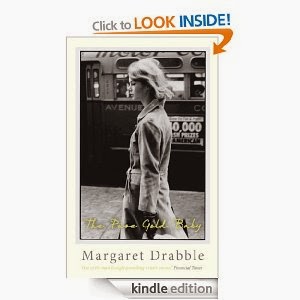It's ten o'clock on a Saturday morning and I'm heading for Liverpool. Gradually the train fills: a family of four then a girl on her own, a group of three men and then another man in dirty jeans. 'Sorry to interject,' Dirty Jeans says lurching between our legs. He's drunk. We all know it. Not just from the alcohol on his breath, but the way he moves, the way the words slide too easily one onto another. 'Now can you tell me,' he says to the white-haired man next to him, 'if I got out at Saint James...' The conversation goes on. I stop listening.
A few minutes later, the drunk is out of his seat again...and then back again, hovering around this novelty of a man who talks back. A tipsy moth. 'What're you reading?' Dirty Jeans asks, and I feel I can't tell him. About the ancient Greeks, I'd have to tell him, a friend's book, an episode when some Trojans ...
'You're embarrassing her,' the middle-aged man says, 'Leave her alone with her Fifty Shades of Grey.'
We exchange grins.
'What you want to do is get off at the next stop,' he says to the drunk,'go on, hurry up. You'll miss it.'
And so the drunk is off, swerving up the bank at a place he doesn't want to be, the rest of us considering how sad it is to be so well oiled that time in the morning. And how little time he has left.
The Centre is just a short walk from Central station. It is not how I remember it. When I went there last it retained its old-school atmosphere - from a time when Liverpool could afford to bestow an indulgent charity on the uneducated poor - but now it is has been modernised following a 'City of Culture' grant in 2008. There is a cafe. A woman at a desk. The door to the meeting room is only accessible by means of an electronic key - as if the uneducated poor must now be kept at bay. It smells of disinfectant and reminds me of another school - the one I used to go to over thirty years ago - another experiment in concrete and raw hard building surfaces, and plastic chairs, and spaces that fill with harsh unmuffled sound.
So we sit and listen to a talk by a children's author on how it is necessary to have 'iron balls' to get what you want to do: to interrupt auditions with demands of your own, to heckle an editor with emails reminding him again and again what you have to offer, to put up with being tied up in a sack and kicked by year six pupils in the name of 'literacy', and to offer Skype and feedback on social networks.
For lunch we are served doorstep sandwiches and chips - with a bowl of fruit as a nod towards healthy eating.
In the afternoon, we listen to a man who has crossed Africa by foot: a place where there are no doubt more 'uneducated poor', and I learn that Lake Malawi is an inland sea - so large that when there are storms, boats are lost - and I gaze at the magnificence of the Victoria Falls and long to see them.
Then it is time to go. The gluten-free brownies are gone - complete with the packet - and in the bowl of fruit, that no one seems to have touched, is one peeled banana. We look at it. The fact it has been peeled. The fact it has been put back.
We retire to a pub near the station: empty and quiet like the abandoned outpost of an empire. There's broken glass on the table, a drum-kit on a stage at one end, a bar that runs out of wine after filling one glass and a sign on the cash-only bar that tells us that a code is needed for the toilet.
'Now what do I do - eat it?' asks Lisa when she returns, showing us a piece of paper with numbers like a lottery ticket.
So we take leave of each other at Lime Street: one south to London, another north to Carlisle, while I am just in time for the Wirral line train for Chester. My final day as Chair - and strangely I feel I'm just getting the hang of this.



























